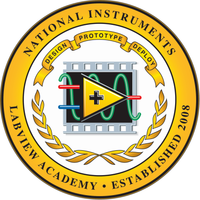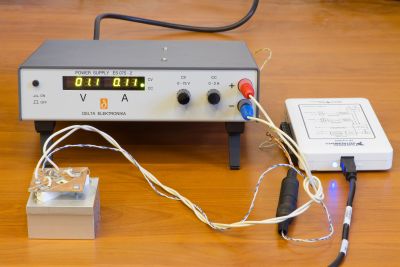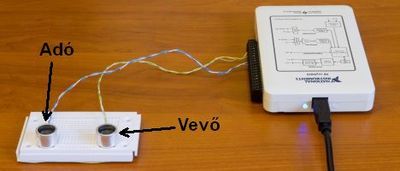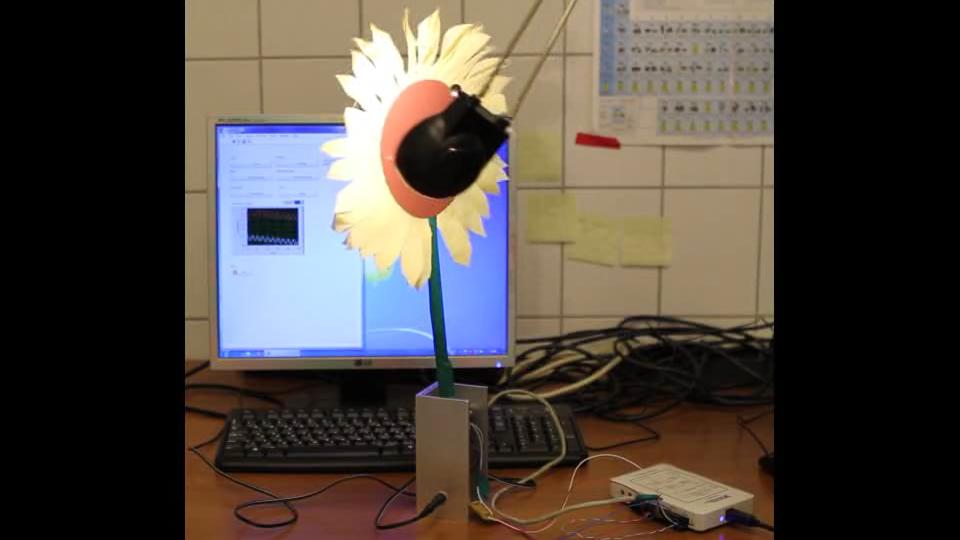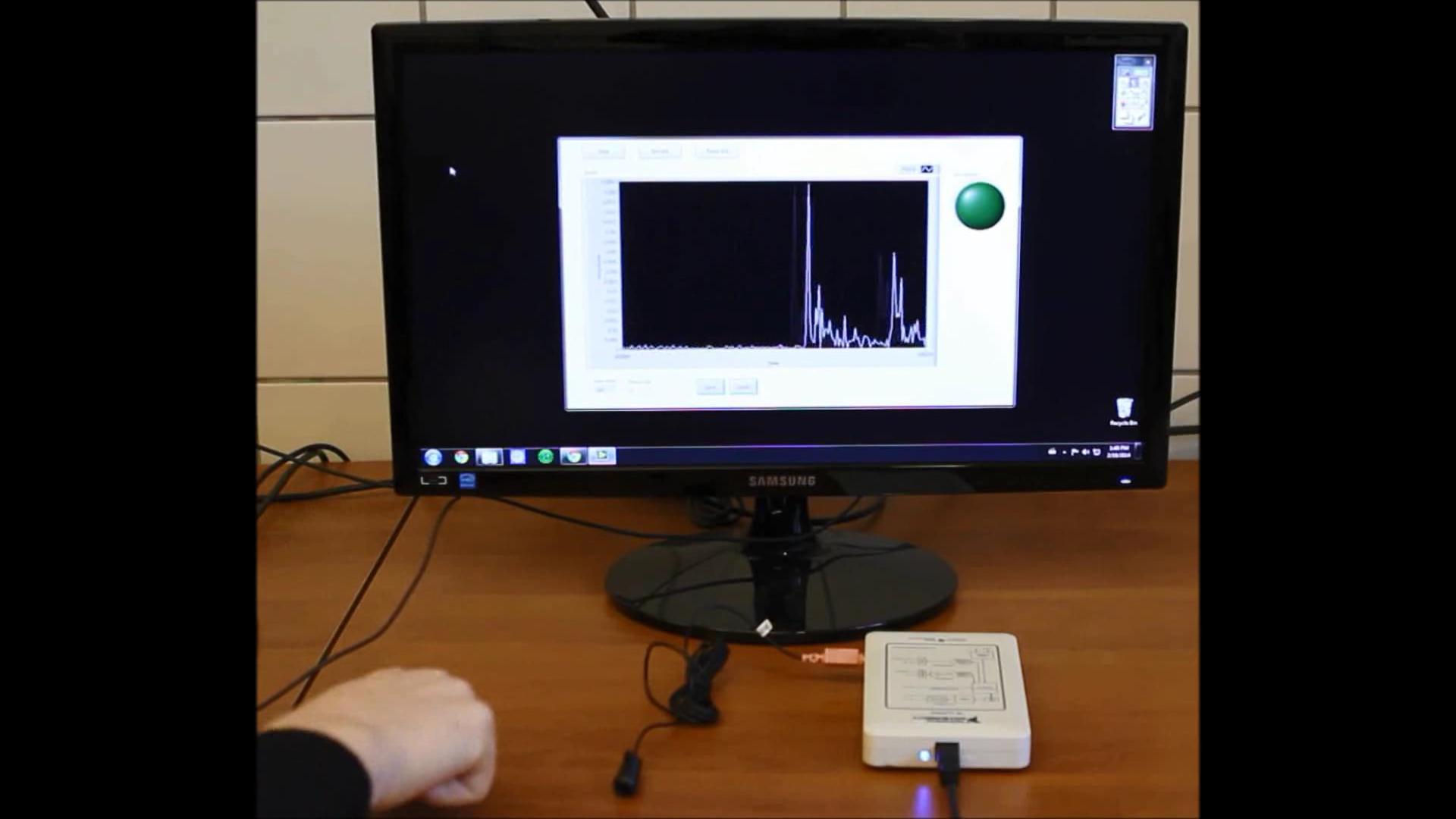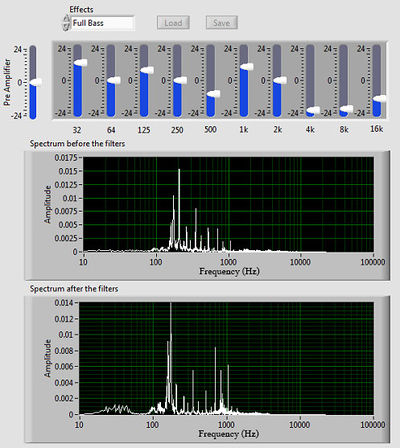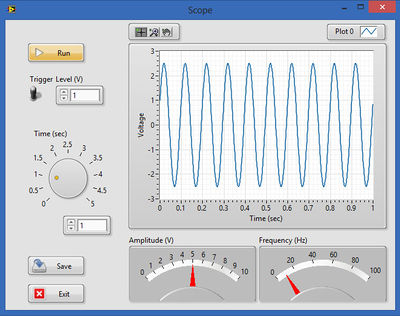„Számítógépes mérésvezérlés projektmunka LabVIEW környezetben” változatai közötti eltérés
(→Grafikus programozás és mérésvezérlés LabVIEW környezetben) |
(→Examples for independent project works) |
||
| (egy szerkesztő 16 közbeeső változata nincs mutatva) | |||
| 1. sor: | 1. sor: | ||
| − | = | + | =Measurement Control Project Work in LabVIEW Environment= |
| − | + | __NOTOC__ | |
{| cellpadding="5" cellspacing="0" align="right" | {| cellpadding="5" cellspacing="0" align="right" | ||
|- | |- | ||
| 9. sor: | 9. sor: | ||
| − | == | + | == General Information == |
| − | * | + | * Faculty: Faculty of Natural Sciences (TTK), BME |
| − | * | + | * Code: BMETE11AF39 |
| − | * | + | * Requirement: 0/0/2/f/3 |
| − | * | + | * Language: English |
| − | * | + | * Responsible: András Halbritter |
| − | * | + | * Lecturer: András Magyarkuti |
| − | * | + | * Role in the curriculum: elective ("kötelezően választható") course for bachelor (BSc) students in phyics and master (MSc) students in Physics in the Nanotechnology and Materials Science specialization, and optional ("szabadon választható") for any BME students (BSc, MSc, PhD) with interest in computer controlled measurements. |
| − | * | + | * This is a certified LabView Academy course of the National Instruments company, i.e. the succesful completion of the CLAD exam of National Instruments will be awarded by the proper LabVIEW programmer certificate of NI. |
| − | * | + | * Requirements for attendance: the course is held weekly in the second half of the semester (usually starting from the 6th week) in the F3213 room (8:30-12:00). The grading requires the completion of all laboratory exercises. In case of justified absence replacement occasions are offered (maximum 2 occasions) |
| − | * | + | * Grading: |
| − | : CLAD | + | : the result of the CLAD examm (50%): |
| − | :: 70% | + | :: Grade 3: 70% - 79% |
| − | :: 80% és 89% | + | :: Grade 4: 80% és 89% |
| − | :: 90% | + | :: Grade 5: above 90% |
| − | :: a | + | :: The completion of the course requires a succesful CLAD exam with >70% result. |
| − | : | + | : Grade for the independent project work (50 %) |
| − | == | + | ==Study materials== |
| − | + | additonal materials are available here: [https://drive.google.com/folderview?id=0B_6LXX6KF5hlRnZpOGNDa3FyUFU&usp=sharing LabVIEW_course]. | |
| + | and will be posted on the team of the course. | ||
| − | == | + | ==Examples for independent project works== |
{|style="width: 100%" | {|style="width: 100%" | ||
|- valign="top" | |- valign="top" | ||
{| | {| | ||
| − | + | As an independent project work a complex measurement and/or control exercise is accomplished by each student using the inputs and outputs of an NI MyDAQ data acquisition card. The possible topics can be chosen from a list (see the examples below), or it can rely on your own proposal. | |
|} | |} | ||
{| | {| | ||
|- valign="top" | |- valign="top" | ||
| − | === | + | ===Temperature control=== |
|[[File:Homeres.jpg|400px|left]] | |[[File:Homeres.jpg|400px|left]] | ||
<p align="justify"> | <p align="justify"> | ||
| − | + | The program implements a PI controller [http://en.wikipedia.org/wiki/PID_controller]. The resistance of a Pt100 thermometer is used to record the temperature, and a heater resistor is used for control. The latter is driven by an analog programmable current source. The user of the program can set the the PI control parameters and the setpoint temperature. | |
</p> | </p> | ||
|} | |} | ||
{| | {| | ||
|- valign="top" | |- valign="top" | ||
| − | === | + | |
| + | ===Distance measurement by ultrasound=== | ||
|[[File:Tavolsag2.jpg|400px|right]] | |[[File:Tavolsag2.jpg|400px|right]] | ||
<p align="justify"> | <p align="justify"> | ||
| − | + | A 44 kHz ultrasound transceiver is used as a transmitter (speaker) and receiver (microphone). A short ultrasound pulse of the speaker is reflected on an object. The time delay of the reflected sound at the microphone is used to calculate the distance of the object. | |
</p> | </p> | ||
|} | |} | ||
| 58. sor: | 60. sor: | ||
|- valign="top" | |- valign="top" | ||
| − | === | + | ===Sunflower=== |
|[[File:Napraforgo.ogv |400px|Napraforgó|left]] | |[[File:Napraforgo.ogv |400px|Napraforgó|left]] | ||
<p align="justify"> | <p align="justify"> | ||
| − | + | A sunflower always turns towards the sun to gain more light. This is artificially implemented by light detectors and a stepper motor. | |
</p> | </p> | ||
|} | |} | ||
{| | {| | ||
| − | === | + | ===Knocking recognition=== |
|[[File:Kopogas.ogv|Kopogásfelismerés|400px|right]] | |[[File:Kopogas.ogv|Kopogásfelismerés|400px|right]] | ||
<p align="justify"> | <p align="justify"> | ||
| − | A program | + | A program recognizes a temporal cryptogram, i.e. checks whether the rhythm of knocking mathches a predefined pattern. For proper code an light flashes on the interface. |
</p> | </p> | ||
|} | |} | ||
{| | {| | ||
|- valign="top" | |- valign="top" | ||
| − | === | + | |
| + | ===Equalizer=== | ||
|[[Fájl:Equaliser.jpg|Hangszín szabályozás|400px|left]] | |[[Fájl:Equaliser.jpg|Hangszín szabályozás|400px|left]] | ||
<p align="justify"> | <p align="justify"> | ||
| − | + | The program tunes the amplitude of an input mp3 line in predefined frequency intervals. </p> | |
| − | </p> | + | |
|} | |} | ||
{| | {| | ||
|- valign="top" | |- valign="top" | ||
| − | === | + | |
| + | ===Oscilloscope and function generator=== | ||
|[[Fájl:Scope.jpg|Oszcilloszkóp|400px|right]] | |[[Fájl:Scope.jpg|Oszcilloszkóp|400px|right]] | ||
<p align="justify"> | <p align="justify"> | ||
| − | + | A mixed oscilloscope and function generator device is implemented including trigger functions. | |
</p> | </p> | ||
|} | |} | ||
|} | |} | ||
A lap jelenlegi, 2021. szeptember 5., 07:48-kori változata
Measurement Control Project Work in LabVIEW Environment
General Information
- Faculty: Faculty of Natural Sciences (TTK), BME
- Code: BMETE11AF39
- Requirement: 0/0/2/f/3
- Language: English
- Responsible: András Halbritter
- Lecturer: András Magyarkuti
- Role in the curriculum: elective ("kötelezően választható") course for bachelor (BSc) students in phyics and master (MSc) students in Physics in the Nanotechnology and Materials Science specialization, and optional ("szabadon választható") for any BME students (BSc, MSc, PhD) with interest in computer controlled measurements.
- This is a certified LabView Academy course of the National Instruments company, i.e. the succesful completion of the CLAD exam of National Instruments will be awarded by the proper LabVIEW programmer certificate of NI.
- Requirements for attendance: the course is held weekly in the second half of the semester (usually starting from the 6th week) in the F3213 room (8:30-12:00). The grading requires the completion of all laboratory exercises. In case of justified absence replacement occasions are offered (maximum 2 occasions)
- Grading:
- the result of the CLAD examm (50%):
- Grade 3: 70% - 79%
- Grade 4: 80% és 89%
- Grade 5: above 90%
- The completion of the course requires a succesful CLAD exam with >70% result.
- Grade for the independent project work (50 %)
Study materials
additonal materials are available here: LabVIEW_course. and will be posted on the team of the course.
Examples for independent project works
|
The program implements a PI controller [1]. The resistance of a Pt100 thermometer is used to record the temperature, and a heater resistor is used for control. The latter is driven by an analog programmable current source. The user of the program can set the the PI control parameters and the setpoint temperature. |
|
A 44 kHz ultrasound transceiver is used as a transmitter (speaker) and receiver (microphone). A short ultrasound pulse of the speaker is reflected on an object. The time delay of the reflected sound at the microphone is used to calculate the distance of the object. |
|
A sunflower always turns towards the sun to gain more light. This is artificially implemented by light detectors and a stepper motor. |
|
A program recognizes a temporal cryptogram, i.e. checks whether the rhythm of knocking mathches a predefined pattern. For proper code an light flashes on the interface. |
|
The program tunes the amplitude of an input mp3 line in predefined frequency intervals. |
|
A mixed oscilloscope and function generator device is implemented including trigger functions. |
